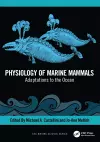
Physiology of Marine Mammals
2 contributors - Paperback
£53.99
Michael A. Castellini earned his PhD from the Scripps Institution of Oceanography and has been a faculty member at the University of Alaska Fairbanks (UAF) since 1989. He was the founding science director for the Alaska SeaLife Center, the director of the Institute of Marine Science at UAF, associate dean and then dean for the School of Fisheries and Ocean Sciences. He is now associate dean for the UAF Graduate School and senior faculty in the Center for Arctic Policy Studies. Dr. Castellini’s research focuses on how marine mammals have adapted to life in the sea, including their biochemical, physiological, and behavioral adaptation for deep and long-duration diving, extended fasting, exercise physiology, hydrodynamics, and even sleeping patterns. In Alaska, his work has extended into issues of population health, contaminant chemistry, reproductive chemistry, and digestive physiology. Dr. Castellini’s graduate students have worked from Alaska to Antarctica on these issues. He has written more than 100 scientific papers and chapters on his work and is involved in local, state, and national panels and committees dealing with policy issues related to marine mammals, ecosystem management, and polar concerns.
Jo-Ann Mellish earned her PhD from Dalhousie University in Canada in 1999. She has been on the research faculty at the University of Alaska Fairbanks with a joint appointment at the Alaska SeaLife Center since 2001. Most recently, she has taken on the role of program manager at the North Pacific Research Board. In a similar path to Dr. Castellini, her dean and mentor for many years, her studies on energetics, health, and condition have taken her from pole to pole. In Alaska, she has focused on innovative approaches to studying physiology in endangered species, and she has worked to raise the bar on thoughtful assessments of the research procedures themselves. In Antarctica, Dr. Mellish has been the lead investigator of a highly collaborative team of experts that melds physiology, ecology, and modeling to better understand phenotypic plasticity and the potential impacts of ecosystem change. Her work has resulted in more than 40 scientific papers.